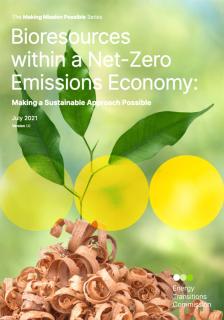
To be sustainable, biomass production should have low-lifecycle greenhouse gas emissions. Its production should take into account the opportunity cost related to carbon. It also must not compete with the use of land for food production, trigger any land-use change that could release carbon stocks into the atmosphere, and negatively impact biodiversity.
In this report, the Energy Transitions Commission (ETC) makes plain that, while bioresources are in principle renewable, not all forms of biomass use are beneficial from an environmental perspective: not all biomass is ‘good’ biomass. On the basis of strict sustainability criteria, the report estimates a prudent scenario for the quantity of clearly sustainable biomass available in the future.
The report is part of the ETC’s wider Making Mission Possible Series – a series of reports outlining how to scale up clean energy provision within the next 30 years to meet the needs of a net-zero greenhouse gas emissions economy by mid-century. The reports in the series analyse and set out specific actions required in the next decade to put this net-zero by 2050 target within reach.
